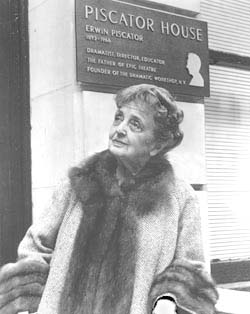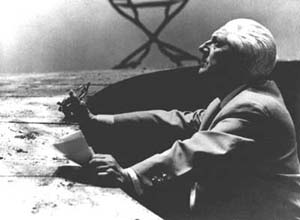In December of 1985 Gregorij H. von Leïtis instituted the Erwin Piscator Award honoring Piscator's artistic and humanitarian legacy and his lasting influence on theatre on both sides of the Atlantic. The Honorary Erwin Piscator Award in memory of Maria Ley Piscator was instituted in 1996 to recognize outstanding supporters of the performing arts.
Erwin Piscator
Erwin Piscator was born on December 17, 1893. He began his career in the theatre in 1913 as an apprentice at the Hoftheater in Munich, Germany. As his career progressed, he founded Das Tribunal, an avant-garde theatre, and directed plays by Strindberg, Wedekind, Sternheim, and the works of Ernst Toller and Georg Kaiser. He became known for his revolutionary work, his love for experimentation, his great scenic innovations, his invention of epic theatre and his vision of stage as a moral institution, a platform from which to call upon man to honor man.
This political theatre, which Piscator envisioned and practiced, examined the function of theatre in the world. Piscator believed in theatre as an instrument to develop interpersonal relationships and to relate human beings to their societies, to their environment and to the world around them, on a conscious level. His emphasis was not merely on presenting a political ideology but rather on a continuing investigation and exploration of the individual's ability to effect change. "The purpose of theatre", said Piscator, "should not only be to teach us about the creative process, but to teach us of human relations, human behavior and capacities. It is to this task, consciously and unconsciously, suggestively and descriptively, that the theatre is best suited." In 1938, the founder of the Piscator Bühne in Berlin left Europe for the United States. Like many of his fellow exiles, Piscator found a new home for his efforts in the New School for Social Research in New York. His Dramatic Workshop, which he conducted there until 1952, influenced a generation of actors, directors, and playwrights. At the Volksbühne Berlin he was artistic director until he died on March 30, 1966, in Starnberg, Germany.
Bertolt Brecht once said of him: "Piscator is the greatest theatre man of all time. He will leave a legacy which we should use."

Maria Ley Piscator
Maria
Ley Piscator was born on August 1, 1898 in Vienna. She began her theatrical
career as a dancer in Berlin and Paris and later turned to choreography.
She helped stage several productions with Max Reinhardt, including his
renowned production of A Midsummer Night’s Dream.
She
studied at the Sorbonne in Paris and finished with a doctorate in literature.
In Salzburg she met Erwin Piscator, her third husband, and married him
on April 15, 1937 in Paris. The two immigrated to the United States on
January 1, 1939 and founded the Dramatic Workshop at the New School for
Social Research in Manhattan. Their students included Stella Adler, Harry
Belafonte, Marlon Brando, Tony Curtis, Anthony Franciosa, Tony Randall,
and Elaine Stritch, among others.
Maria
Piscator also directed more than 50 theatrical productions on and off
Broadway and in Europe. She wrote two novels and a book of poetry, and
translated many works, including Lendemain, presented at the Théâtre
des Champs-Elysées, Paris, the same theater where her Metamorphosis
was seen in 1971. Other books include The Piscator Experiment: The
Political Theater, which was published by James H. Heinemann in 1967,
a year after her husband’s death, and her autobiography, Mirror
People, published in 1989.
Maria
Ley Piscator’s teaching included work in the 1970’s at the University
of Southern Illinois at Carbondale and at the State University of New
York at Stony Brook. In the mid 1980’s she began working with the
Elysium Theater Company and in 1993 became the Honorary Artistic Director
of Elysium – Between Two Continents.
She
died at the age of 101 on October 14, 1999 in Manhattan.
| Erwin
Piscator Award Recipients |
|
| 2014 | Harold Pince |
| Vartan Gregorian (Honorary Award) | |
| 2013 | André Bishop |
| Barbara Goldsmith (Honorary Award) | |
| 2012 | Thomas Hampson |
| Louise Hirschfeld Cullman and Lewis B. Cullman (Honorary Award) | |
| 2011 | E.L. Doctorow |
| Peter Gelb (Honorary Award) | |
| 2010 | Martina Arroyo |
| Carol Kahn Strauss (Honorary Award) | |
| Luise Rainer (Life Achievement Award) | |
| Christine Ostermayer (Piscator Jubilee Award) | |
| 2009 | Marian Seldes |
| Max Kade Foundation - Lya Friedrich Pfeifer (Honorary Award) | |
| 2008 | Edward Albee |
| Meera T. Gandhi (Honorary Award) | |
| 2007 | Deborah Voigt |
| Alexandra Kauka (Honorary Award) | |
| Marta Eggerth (Life Achievement Award) | |
| 2006 | Elaine Stritch |
| Deutsche Bank Americas Foundation (Honorary Award) | |
| 2005 | Ben Gazzara |
| Donald M. Kendall (Honorary Award) | |
| 2004 | Kitty Carlisle Hart |
| Dr. Johann Georg Prince of Hohenzollern (Honorary Award) | |
| 2003 | Anna Moffo |
| Kurt F. Viermetz (Honorary Award) | |
| 2002 | Kurt Masur |
| Dr. Bernd-A. von Maltzan (Honorary Award) | |
| 2001 | Anne Jackson and Eli Wallach |
| Drs. Ellen Hedda and Peter Landesmann (Honorary Award) | |
| 2000 | Ellen Burstyn |
| Anna-Maria and Stephen M. Kellen (Honorary Award) | |
| 1999 | Tony Randall |
| Mary Sharp Cronson (Honorary Award) | |
| 1998 | Uta Hagen |
| Martha W. Coigney (Honorary Award) | |
| 1997 | Lanford Wilson |
| Prof. Gabriele Henkel (Honorary Award) | |
| 1996 | Marshall W. Mason |
| Lucille Lortel (Honorary Award) | |
| 1995 | Prof. Dr. Margret Herzfeld-Sander |
| Prof. Dr. Volkmar Sander | |
| 1994 | William M. Hoffman |
| 1993 | Klaus Dieter Wilke |
| 1990 | Robert Wilson |
| 1989 | Peter Zadek |
| 1988 | Judith Malina |
| 1987 | Giorgio Strehler |
| 1986 | Lee Grant |
